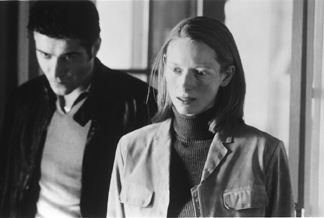Maternal Instinct
'The Deep End' Combines Suspense With Emotional Turmoil
By Patrick Reed

Jonathan Tucker and Tilda Swinton find out how far they'd go to protect their family.
It seems to happen nearly every movie summer. Amidst all of the big-budget, opening-weekend "motion picture events" that are here today, gone tomorrow, one or two more modest films slowly build enough support based on viewers' recommendations to create some staying power and a tidy profit as well. Last summer it was Croupier; the summer before, Buena Vista Social Club; in 1998, Pi. All preliminary evidence (strong word of mouth, a teeming critical mass) indicates that The Deep End is shaping up to be this year's model. Featuring a superlative performance by Tilda Swinton as a wealthy mother of three-turned-criminal accomplice, The Deep End is anchored by a fairly conventional suspense plot, which becomes the basis for a larger, penetrating analysis of emotional alienation. What appears at first to be a well-made suspense picture becomes a far more gripping character study as well - and while the Hitchcockian elements may draw the audience's initial interest, it's Swinton's tortured portrayal that makes Deep a must-see.
Scott McGehee and David Siegel worked together as writer-director-producers back in 1993 on the little-seen indie film Suture. The Deep End is their second, belated project; based on the 1947 book The Blank Wall by Elisabeth Sanxay Holding, the story was first adapted to film as The Reckless Moment (1949) by the legendary director Max Ophuls during his brief stay in Hollywood. Although McGehee and Siegel place their remake in a thoroughly modern context - from the affluent shores of Lake Tahoe to the middle-class gambling mecca of Reno, Nevada - they adhere to the story's original premise, and it's an engrossing one: How far will a mother go to protect her children? Would she cover up their crimes?
Swinton stars as Margaret Hall, an early-forties wife of a naval officer who manages a hectic household alone in Lake Tahoe while her husband is away on extended duty. Besides her three kids, Margaret also has to monitor her aging father-in-law (Peter Donat, Mulder's father on The X-Files). However, as the film begins Margaret is primarily concerned with her son Beau (Jonathan Tucker), a high school senior and trumpet prodigy who has been keeping reckless company with a charismatic thirty-year-old named Darby Reese (Josh Lucas). Margaret drives into Reno and confronts Reese at the nightclub where he works, but instead of heeding Margaret's demand that he end the relationship, that night Reese drives out to Tahoe to rendezvous with Beau in the boathouse. The two begin to argue about their clandestine romance, passions provoke violence, blood is spilled and when Margaret rises for her morning run she finds Darby Reese's body literally anchored to the shoreline.
Filled with manic, white-knuckled desperation, Margaret hurriedly conceals the corpse in the lake, but it is soon found. Almost immediately afterward, a young Eastern European man named Alek Spera (Goran Visnjic, from ER) appears at the house with a videotape that could implicate Beau in Darby's murder. Catching Margaret's heartbroken reaction to the tape's contents, Spera quickly threatens to turn it over to the police and press unless Margaret comes up with $50,000 to divide between Spera and his older, crueler partner Nagle (Raymond J. Barry). Thus events are set into a whirlwind motion: Margaret attempts to obtain the money, but it soon becomes hopeless since her husband is away and temporarily unreachable. Although appearing to be a tough guy, Spera soon reveals hints of vulnerability, shame and even valor - but it's Nagle who is calling the shots, and he keeps the extortion pressure on as Margaret careens out of control, in plain sight of her children.
This plot uncertainty in Deep definitely keeps you guessing, but as the intensity increases something else occurs that elevates this film beyond genre and to a different level. Though Margaret is enduring a living hell, her maternal protectiveness pushed to the absolute limit, it becomes clear that she is feeding off of an energy that was totally absent from her previous, everyday life. Since her cipher of a husband can't be counted on for anything, Margaret incredibly develops a tentative attraction to Alek Spera - and as the film spirals to a cathartic conclusion, her emotions are laid bare.
The Deep End's technical and acting credits are excellent across-the-board, but special mention must be made in three areas. McGehee and Siegel's direction balances classic suspense pacing with a constant undercurrent of alienation and claustrophobia (even considering Lake Tahoe's expanse). The camerawork, supervised by Giles Nuttgens, is pristine, with vibrant colors - this is a great-looking film. Finally, Tilda Swinton (who has worked far-too-infrequently in the States since first receiving attention via the daring European import Orlando in 1992) absolutely dominates The Deep End with one of the more complex and daring acting efforts in quite some time.
HOME | THIS ISSUE | ACE ARCHIVES